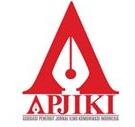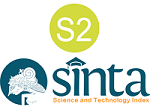Empowering females through beauty for better life program as corporate social responsibility
Abstract
Background: Low-economic Female Heads of Household (FHH) needs to be empowered amidst a patriarchal culture. The Female Heads of Household Empowerment Foundation (PEKKA) has developed a partnership with L’Oreal to empower FHH through hairdressing training, called Beauty for a Better Life (BFBL). Purpose: This study investigated the FHH empowerment program as a corporate social responsibility in Cianjur through the framework of partnership, support, and impact. Methods: This case study adopted a qualitative approach with seven informants. It examined FHH empowerment activities under the L’Oreal CSR program in Cianjur. Data was obtained through interviews, observations, and literature studies. Analysis techniques consisted of data collection, data reduction and presentation, and conclusion drawing. Results: Partnerships are established to open FHH access to resources and build economic independence. Support for the CSR implementation includes competent coaches, funds, curricula, products, and advocacies. The program successfully empowers the community economically, increases self-confidence, and builds motivation for self-capacity. Conclusion: The partnership overcomes the obstacles of FHHs to engage in the CSR program. L’Oreal has supported the FHH with the CSR program towards a sustainable and advanced community. The training results have a positive impact and support for empowered FHH. Implications: This study suggested enhancement of FHH access to education, employment, or other resources. Besides, strengthening self and family capacity has a significant long-term impact on improving economic and social independence. Furthermore, inter-sector collaboration is vital to support the FHH empowerment and to deliver recommended policies to improve the effectiveness of relevant programs in the future.
Keywords
Full Text:
PDFReferences
Ahmadi, R. (2020). The Role of Non-formal Education in Empowering Women to Improve The Family Economy. EDUTEC : Journal of Education And Technology, 4(2), 315–324. https://doi.org/10.29062/edu.v4i2.161
Akhmedshina, F. (2020). Violence against women: a form of discrimination and human rights violations. Mental Enlightenment Scientific-Methodological Journal, 2020(1), 13–23.
Arboleda, P. (2019). Reimagining unfinished architectures: Ruin perspectives between art and heritage. Cultural Geographies, 26(2), 227–244. https://doi.org/10.1177/1474474018815912
Ballon, P. (2018). A structural equation model of female empowerment. The Journal of Development Studies, 54(8), 1303–1320.
Burfat, I. A., Khaskheli, W. A., & Qureshi, J. A. (2019). Social and cultural barriers in women empowerment: A case study of district Jamshoro. Grassroots, 52(2).
Büyükyörük, N. (2022). Analysis of women’s poverty experiences with grounded theory approach. Turkish Journal of Health Science and Life, 5(2), 72–80. https://doi.org/10.56150/tjhsl.1028495
Creswell, J. W. (2013). Qualitative inquiry &research design : choosing among five approaches (2nd ed.). SAGE Publications.
Frendika, R., Gaus, N., & Budiarti, I. (2022). Bridging Gender Equality in The Workplace: The Role of Personal Branding and Self-Confidence. MIMBAR: Jurnal Sosial Dan Pembangunan, 38(1).
Habib, T. (2017). Struggles of female household helds in Bangladeh : a qualitative study. Antrocom Online Journal of Antropology, Vol. 13, N, 125–136.
Haque, A. (2023). CSR Through Responsible Leadership for Sustainable Community Development: A Developing Nation Perspective (pp. 29–45). https://doi.org/10.1007/978-3-031-27512-8_3
Haryono, D., Wisadirana, D., & Chawa, A. F. (2018). Strategi Pemberdayaan Komunitas Perempuan Miskin Berbasis Agribisnis. Dimas: Jurnal Pemikiran Agama Untuk Pemberdayaan, 18(1), 1. https://doi.org/10.21580/dms.2018.181.2897
Hatipoglu, B., Ertuna, B., & Salman, D. (2019). Evaluation of a Turkish company’s progress towards a CSR 2.0 approach to corporate governance. Corporate Sustainability and Responsibility in Tourism: A Transformative Concept, 343–360.
Irawati, R. (2018). Pengaruh pelatihan dan pembinaan terhadap pengembangan usaha kecil. Jurnal Ilmiah Bisnis Dan Ekonomi Asia, 12(1), 74–84. https://doi.org/10.32812/jibeka.v12i1.18
Jivani, A. I. (2020). Gender Lens to the Future of Work. Daedalus, 149(1), 134–143. https://doi.org/10.1162/daed_a_01778
Johnson, D. N. (2018). Strategies small business salon owners use to survive longer than 5 years. Walden University.
Kartika, R. (2016). L’Oréal Berbagi Inspirasi. PR Indonesia. https://www.prindonesia.co/detail/440/LOréal-Berbagi-Inspirasi
Karwati, L. (2017). Womens’ Empowerment Program to Develop the Potential of Entrepreneurship. Proceedings of the 3rd NFE Conference on Lifelong Learning (NFE 2016). https://doi.org/10.2991/nfe-16.2017.61
Kulal, A., Abhishek, N., Kumar, S., & Gururaj, P. (2023). Does Higher Education Influence on Women Empowerment? A Perceptual Study. Parikalpana KIIT Journal of Management, 19(1), 7–20.
Kumar, A. (2019). Impact of training and capacity building programme for the upliftment of women self-help group members, in rural areas of Himachal Pradesh: A review of studies.
L’Oréal. (2023). Rayakan 1 Dekade Transformasi 3,749 Perempuan Pra Sejahtera Raih Kehidupan Lebih Baik Melalui Pelatihan Kecantikan L’Oréal Beauty For a Better Life. Accessed from: https://www.mediapatriot.co.id/2023/03/09/rayakan-1-dekade-transformasi-3749-perempuan-pra-sejahtera-raih-kehidupan-lebih-baik-melalui-pelatihan-kecantikan-loreal-beauty-for-a-better-life/
Lenka, P. (2023). Philosophy of Sustainable Development: Understanding the Significance of Gender Equality in Business Organisations. Problemy Ekorozwoju, 18(2), 121–127. https://doi.org/10.35784/preko.3950
Lockley, A., Marcoes, L., Nugroho, K., & Gina, A. (2019). Aksi kolektif perempuan untuk pemberdayaan di Indonesia. Jurnal Perempuan.
Lu, J., Ren, L., Zhang, C., Rong, D., Ahmed, R. R., & Streimikis, J. (2020). Modified Carroll’s pyramid of corporate social responsibility to enhance organizational performance of SMEs industry. Journal of Cleaner Production, 271, 122456. https://doi.org/10.1016/j.jclepro.2020.122456
Marwah, N. (2019). Pemberdayaan masyarakat melalui program corporate social responsibility (csr) mandiri bersama bank mandiri di Mrican Umbulharjo. Jurnal Pemberdayaan Masyarakat: Media Pemikiran Dan Dakwah Pembangunan, 2(1), 109–128. https://doi.org/10.14421/jpm.2018.021-06
Mosse, J. C. (2020). Gender & Pembangunan. RIFKA ANNISA Women’s Crisis Centre dan Pustaka Pelajar.
NN. (2015). L’Oreal “Beauty For a Better Life”: Memberdayakan Perempuan yang Kurang Mampu. Mommies Daily. https://mommiesdaily.com/2015/03/12/loreal-beauty-better-life-memberdayakan-perempuan-yang-kurang-mampu
Parker, L., & Creese, H. (2016). The stigmatisation of widows and divorcees (janda) in Indonesian society. In Indonesia and the Malay World, 44(128), 1–6 Taylor & Francis.
Parlindungan, D. R., Fitriana, N., & Wibowo, T. O. (2023). Pemberdayaan Masyarakat Pesantren dalam Mengembangkan Santripreneur melalui Program CSR. Sahafa Journal of Islamic Communication, 5(2), 258–272. https://doi.org/10.21111/sjic.v5i2.8807
Pirak, A., Negarandeh, R., & Khakbazan, Z. (2019). Post-divorce regret among Iranian women: A qualitative study. International Journal of Community Based Nursing and Midwifery, 7(1), 75–86. https://doi.org/10.30476/IJCBNM.2019.40848
Popescu, M. L., & Alonzo, D. (2022). Creating SPACE. Advances in Social Work, 21(4), 1064–1082. https://doi.org/10.18060/25090
Putera, A. K., & Wahyono, W. (2018). Pengaruh kualitas pelayanan, citra merek dan kualitas produk terhadap loyalitas konsumen melalui kepuasan konsumen. Management Analysis Journal, 7(1), 110–119.
Rodiah, S., Dida, S., Maryani, E., & Mustaffa, N. (2022). The Role of Interpersonal Communication in the Empowerment of Female Heads of Household in Cianjur, Indonesia. Jurnal Komunikasi: Malaysian Journal of Communication, 38(4), 181–195. https://doi.org/10.17576/JKMJC-2022-3804-10
Serikat PEKKA. (2018). Pemberdayaan perempuan kepala keluarga (PEKKA). Serikat Nasional PEKKA. https://pekka.or.id/latar-belakang/
Singerman, D. (2021). The Family, Politics, and the Familial Ethos. In Avenues of Participation (pp. 41–73). Princeton University Press.
Sugiono. (2011). Metode Penelitian Kuantitatif, Kualitatif, dan R&D. Alfabeta.
Sulaiman, A. I., & Ahmadi, D. (2020). Empowerment communication in an islamic boarding school as a medium of harmonization. Jurnal Komunikasi: Malaysian Journal of Communication, 36(4). https://doi.org/10.17576/JKMJC-2020-3604-20
Tiwari, P., & Malati, N. (2023). Role of Training in Women Empowerment: An Empirical Analysis. Journal of Technical Education and Training, 15(1). https://doi.org/10.30880/jtet.2023.15.01.020
Wang, W. T., Wang, Y. S., & Chang, W. T. (2019). Investigating the effects of psychological empowerment and interpersonal conflicts on employees’ knowledge sharing intentions. Journal of Knowledge Management, 23(6). https://doi.org/10.1108/JKM-07-2018-0423
Withisuphakorn, P., Batra, I., Parameswar, N., & Dhir, S. (2019). Sustainable development in practice: Case study of L’Oréal. Journal of Business and Retail Management Research, 13(Special).
Yanuarta, N. (2015). Berdayakan Perempuan Lewat Pelatihan Tata Rambut Gratis. Antara Kantor Berita Indonesia. https://www.antaranews.com/berita/481951/berdayakan-perempuan-lewat-pelatihan-tata-rambut-gratis
Zaki, T. S. A. B. T., Abdullah, N. H., Ahmad, M. F., & Hassan, I. (2023). Community-Based Corporate Social Responsibility: a Series of Confirmatory Factor Analyses. International Journal of Professional Business Review, 8(4), e01537. https://doi.org/10.26668/businessreview/2023.v8i4.1537
Zulminarni, N. (2020). Transformasi program menuju gerakan sosial. In et al Hartiningsih (Ed.), Mereka yang Terjaga : Birokrat di balik gagasan pemberdayaan masyarakat di Indonesia (1994-2014) (p. 186). Bappenas.
DOI: https://doi.org/10.24198/prh.v9i1.54877
Refbacks
- There are currently no refbacks.
Copyright (c) 2024 SALEHA RODIAH

This work is licensed under a Creative Commons Attribution-NonCommercial-ShareAlike 4.0 International License.
PRofesi Humas Indexed by:



 Editorial Office of PRofesi Humas: Faculty of Communication Science, Universitas Padjadjaran
Editorial Office of PRofesi Humas: Faculty of Communication Science, Universitas PadjadjaranJl. Raya Bandung-Sumedang Km. 21 Jatinangor, Sumedang, Indonesia 45363
WA: +6282316731181 (Chat Only) Telephone: +62227796954
Faxmile: +62227794122
Email: jurnal.profesihumas.fikom@unpad.ac.id
PRofesi Humas Supervised by:

 View My Stats
View My Stats








